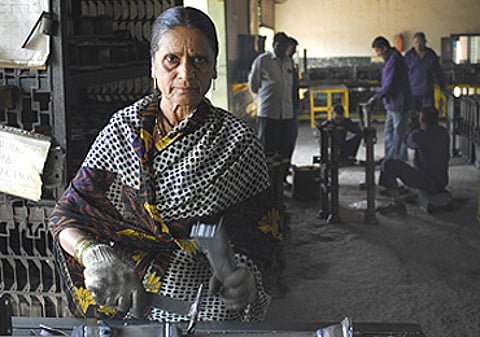That was nearly three decades ago. Today, as she defies her mutilated fingers to operate the deburring machine at a factory not far from the hospital where she was cured, the illiterate 40-year-old widow exudes confidence. Both her daughters go to college, while her son is busy preparing for his Class 10 board exams. And when relatives who once shunned her come calling at her well-appointed 500 sq ft apartment, her eyes can't help shimmering with pride.
What's transformed Chaandane's life is the sense of purpose and control over her future that she shares with her 98 male and 12 female colleagues at the factory. They're all members—and owners—of the Dr Minoo Mehta Apangoddhar Sahkari Audyogik Utpadak Sanstha (MMASAUS), a unique cooperative society formed by leprosy-cured patients.
A past history of sores, ulcers, deformities and social stigma may have brought them together. But what connects them is their resolve to turn the all-too-visible reminders of a cruel affliction into affirmations of a vibrant future. Declared cured of the leprosy that once ravaged their bodies, they are now busy healing their spirits.
At their 10,000 sq ft factory, these men and women display a resilience tougher than the precision-machined components, press parts, fabricated assemblies and forging items they crank out for the automotive industry. And the stories of their grit go well beyond the Rs 4,500-Rs 5,500 that they make every month.
Dattatreya Tapkir was a 25-year-old father of one when the disease struck him in the early '80s. "I was about to be made permanent as a helper in an engineering firm when I had to pull out for treatment," he says. "My family was in dire straits. In the four years I spent in the hospital, I craved death as I knew the stigma wouldn't go away even when I got better." Things began to change in 1983 when he joined MMASAUS as a helper. Notwithstanding the stump he has for a right foot and an eye deformity, the 52-year-old has grown through the ranks to become a driller, and enabled his son to land a coveted bank job.
Life was a smooth ride for Gulab Pardeshi, a gunner in the Indian army, until at age 22, he started experiencing swelling and loss of sensation in his limbs. As the doctor broke the news to his mother, he told her: "Iske bartan bahar rakh do." What followed were seven years of treatment in Nasik and Pune hospitals, which was where he met his wife, Sita, another patient. Now a job inspector at MMASAUS, which he joined in 1991, the 52-year-old father of two schoolgoing sons says: "Life here has helped us forget our past like a bad dream."
